10 Best Customer Support Tools

Any successful business encompasses good customer service. Customers need fast and effective responses when they encounter problems. And that is where customer tools come in. Businesses can use these tools to easily talk to customers, resolve problems, and leave them happy.
In the current society, clients want speedy assistance. They may make calls, e-mail, chat, or even use social media to contact. Customer tools assist businesses in dealing with all these forms of communication with customers. Having the proper tools, companies will be able to answer questions faster, solve problems more efficiently, and make customers feel valued.
This resource will reveal to you the top 10 customer support tools described today. We will show what each of the tools performs, their prices, and who ought to use the tools. By the close, you will be able to determine the Customer tools that suit your business.
What Are Customer Support Tools?
Customer support tools refer to software programs that assist businesses in offering quality services to customers. Imagine them as online assistants who simplify and accelerate customer service. Some advanced options, like an AI customer success tool, can even automate responses and proactively resolve customer issues, taking efficiency to the next level.
These instruments accomplish a lot of significant tasks. They assist in sorting out questions of customers, stay on top of issues until they are resolved, and enable support teams to collaborate. Even simple questions can be answered by some support tools automatically, which leaves human workers to work on some more complicated problems.
The most advantageous aspect of the current customer tools is the fact that they ensure that everything is centralized. Support teams can view all conversations with customers on a single dashboard, rather than checking emails, phone systems, and chat messages individually. It is then very easy to assist customers in a faster and efficient manner.
Why Look for Customer Support Tools?
- Faster Response Times: Customer support tools enable you to respond much faster to Customer questions than when you do everything manually.
- Better Organization: Such tools store all the information and communication of the customers in a single, easy location.
- Cost Savings: Physical customer tools decrease the size of the support staff because each individual becomes more productive.
- Happy Customers: When the customers receive quick, friendly service, they will remain loyal and refer other people to your business.
- Easy Growth: The more your business expands, the more customers can be served with fewer personnel through the use of customer tools.
Key Features to Look for in Customer Support Tools
- Multi-Channel Support: The tool needs to be able to work across email, chat, phone, and social media.
- Automation Features: Find the tools that will automatically answer the common questions and can sort the tickets by their importance.
- Reporting and Analytics: Good tools will provide easy-to-read reports about the work of your support team.
- Integration Capabilities: The tool must be compatible with other software in use by your business.
- User-Friendly Interface: Select tools that your team can grasp to use daily.
Top 10 Best Customer Support Tools
1. Zendesk
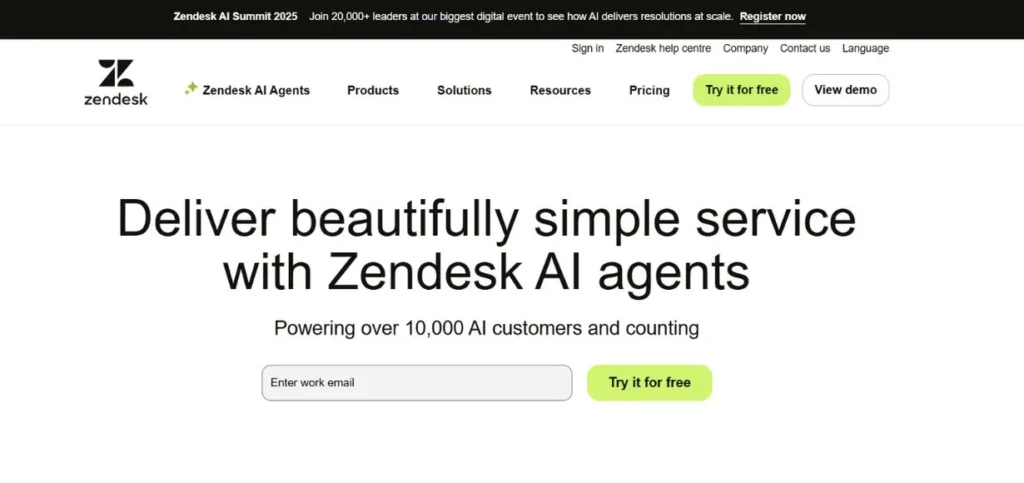
Zendesk is a customer support tool that is popular in the world. It began as a mere ticketing platform but has developed into a full-service customer support platform. Zendesk is suitable for businesses of both small and large sizes. The platform has earned a reputation as a user-friendly and yet powerful platform. It manages emails, chats, phone calls, and social media messages under a single platform. Zendesk is a trusted business since most businesses prefer to trust it due to its long years of service.
Key Features:
- Ticket management system
- Live chat functionality
- Knowledge base creation
Pros:
- Very easy to use
- Works with many apps
- Great customer support
Cons:
- Can be expensive
- Some features cost extra
- Setup takes time
Best For: Medium businesses
Pricing: Starts at $19 per month per agent
Website: https://zendesk.com
2. Freshdesk
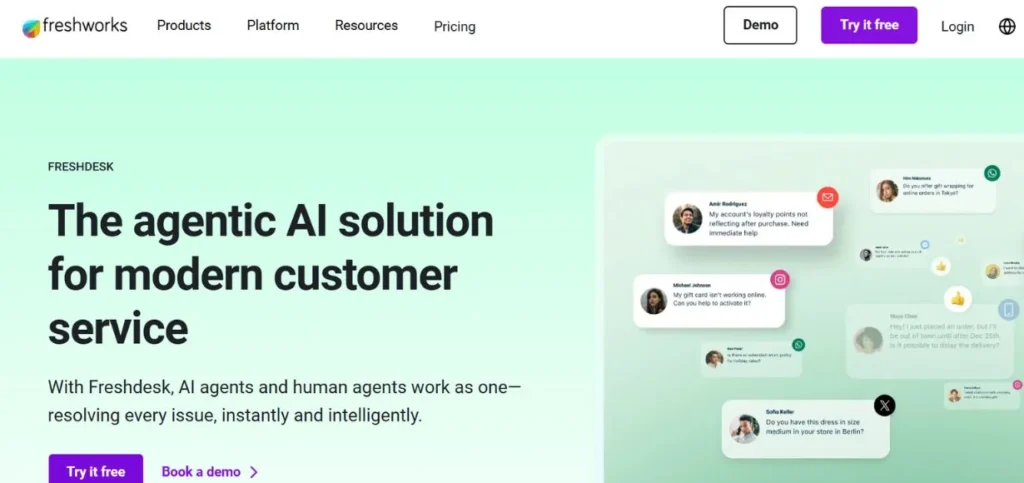
Freshdesk is an effective customer support software that aims to simplify customer service. It is produced by Freshworks, a corporation that specializes in developing business programs that are easy to use. Small and medium businesses particularly like Freshdesk as it provides a lot of features at a low cost. The platform contains all the customer support features, including rudimentary support for ticket management and high-tech automation. Among the aspects that distinguish Freshdesk is the fact that it gamifies customer support, which makes helping customers fun for support agents.
Key Features:
- Smart ticket routing
- Team collaboration tools
- Performance reporting
Pros:
- Free plan available
- Intuitive user interface
- Good automation features
Cons:
- Few personalisation choices.
- Phone support costs extra.
- Certain features are not advanced.
Best For: Startups
Pricing: Free plan available, paid plans start at $15 per month per agent
Website: https://freshdesk.com
3. Intercom
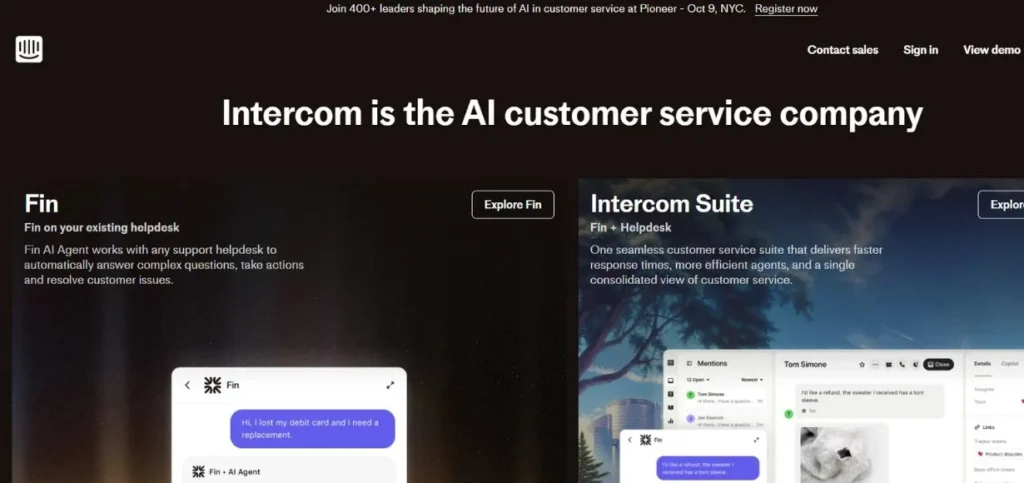
Intercom is a current-day customer support technology that began as a chat service and expanded to be an entire customer communication platform. It is created to assist businesses in establishing relationships with customers by having personalized discussions. Intercom is particularly good at customer engagement tools, helping businesses not just solve problems but also engage with customers proactively. The platform applies intelligent technology to interpret customer behavior and recommend how it can be most useful in assisting the customers.
Key Features:
- Messenger and live chat
- Customer data platform
- Automated workflows
Pros:
- Beautiful, modern interface
- Strong messaging features
- Good customer insights
Cons:
- Quite expensive
- Can be complex
- Limited phone support
Best For: Online businesses
Pricing: Starts at $39 per month per seat
Website: https://intercom.com
Also Read: Top SMS Marketing Software
4. HubSpot Service Hub
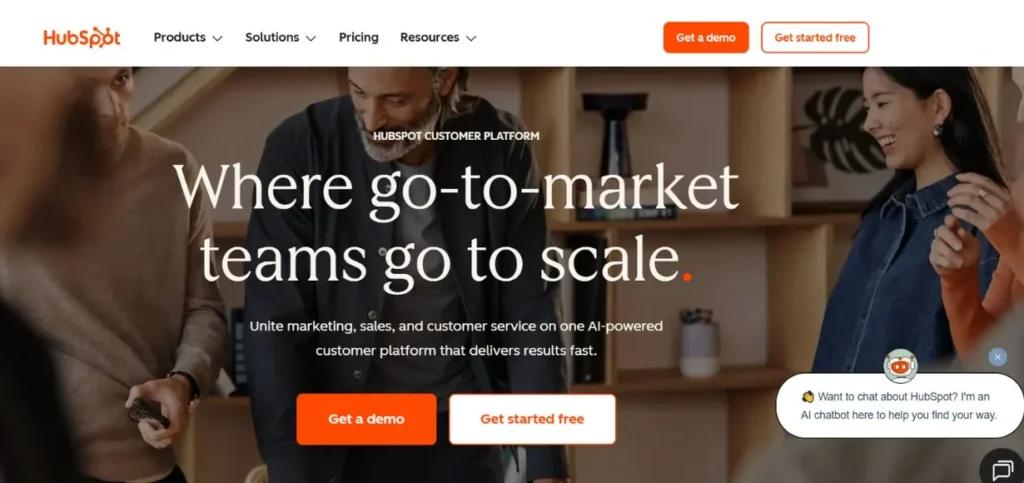
HubSpot Service Hub is a subset within the larger business platform of HubSpot, which consists of marketing, sales, and customer service products. The integration has seen it become one of the most holistic customer support tools. Service Hub is aimed at assisting the business not only to address the customer concerns but also to enable the business to build a relationship with the customers throughout the year. It includes powerful customer success tools that help businesses understand how customers use their products and identify opportunities to help them succeed.
Key Features:
- CRM integration
- Customer feedback tools
- Service analytics
Pros:
- Connects with HubSpot CRM
- Comprehensive feature set
- Good free plan
Cons:
- Can be overwhelming
- High features are costly.
- Learning curve exists
Best For: Growing companies
Pricing: Free plan available, paid plans start at $45 per month per user
Website: https://hubspot.com
5. LiveChat
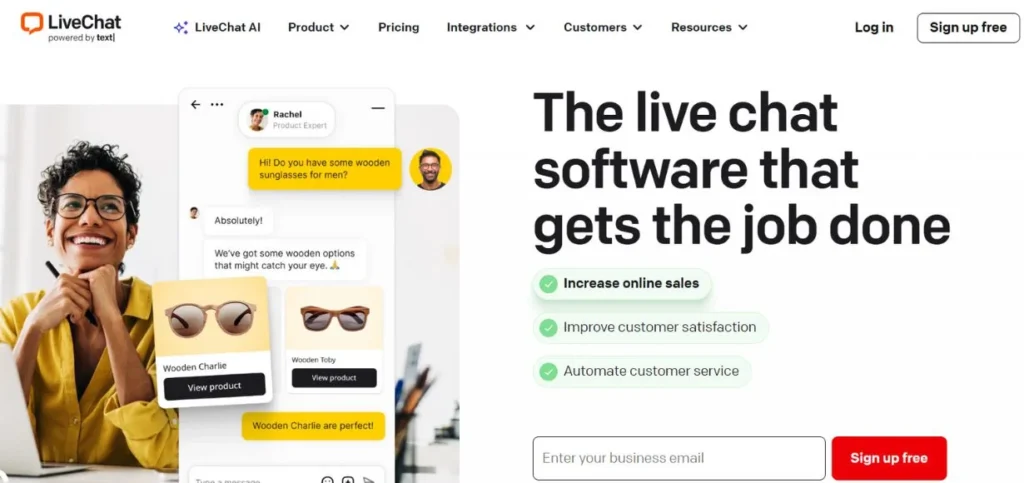
LiveChat is a dedicated customer care utility that deals with real-time chat communication. Although many platforms offer chat as one among the numerous features, LiveChat has made chat support as good as possible, and that is the foundation of their entire platform. The tool is ideal for businesses that require offering immediate assistance to customers and visitors of a site. LiveChat is a good stand-alone or combined with other customer tools. The platform has powerful chat capabilities such as chat routing, canned messages, and comprehensive chat analytics.
Key Features:
- Visitor tracking in real time.
- Chat customization options
- Mobile app support
Pros:
- Excellent chat features
- Easy to implement
- Good mobile app
Cons:
- Limited beyond chat
- No phone support
- Can be pricey
Best For: E-commerce
Pricing: Starts at $20 per month per license
Website: https://livechat.com
6. Help Scout
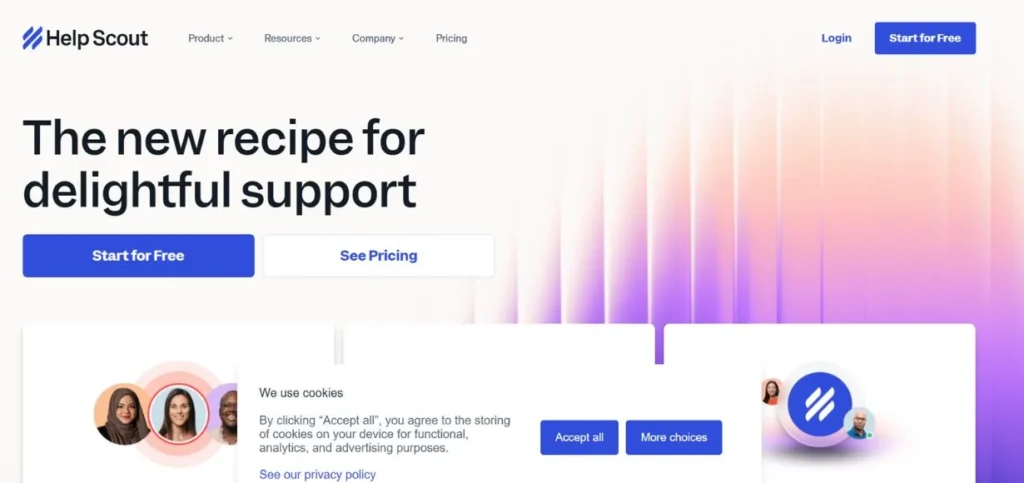
Help Scout is customer support software that is intended to be more personal/less corporate than traditional helpdesk software. The platform is centered on making the end consumer dialogue look and feel natural and human, as opposed to automated support tickets. Small and medium-sized businesses that prefer to have a personal approach to customer service find Help Scout especially popular. The tool includes excellent knowledge base software that helps customers find answers to common questions on their own.
Key Features:
- Shared inbox management
- Surveys of customer satisfaction.
- Knowledge base builder
Pros:
- Clean, simple interface
- Individual support.
- Good knowledge base
Cons:
- Low levels of automation.
- No built-in phone
- Fewer integrations are offered.
Best For: Small teams
Pricing: Starts at $20 per month per user
Website: https://helpscout.com
7. Salesforce Service Cloud
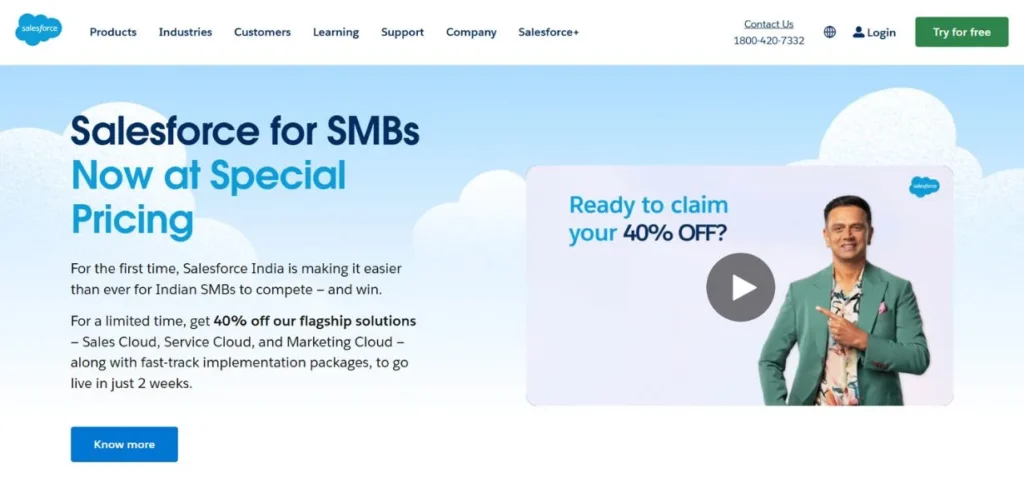
The Salesforce Service Cloud is a customer support enterprise solution that belongs to the largest customer relationship management (CRM) system globally. It is developed to support big companies that require the use of strong, customizable customer service. Service Cloud supports large customer contact volumes across all channels and can therefore benefit large firms with complicated support requirements. The platform includes advanced call center support software with features like automatic call distribution and interactive voice response.
Key Features:
- Case management system
- Einstein AI integration
- Omnichannel routing
Pros:
- Very flexible platform.
- Powerful reporting tools
- Good integration potential
Cons:
- Very expensive solution
- Complex setup required
- Needs technical know-how.
Best For: Enterprises
Pricing: Starts at $25 per month per user
Website: https://salesforce.com
Suggested Read: Top Salesforce Automation Software
8. Kayako
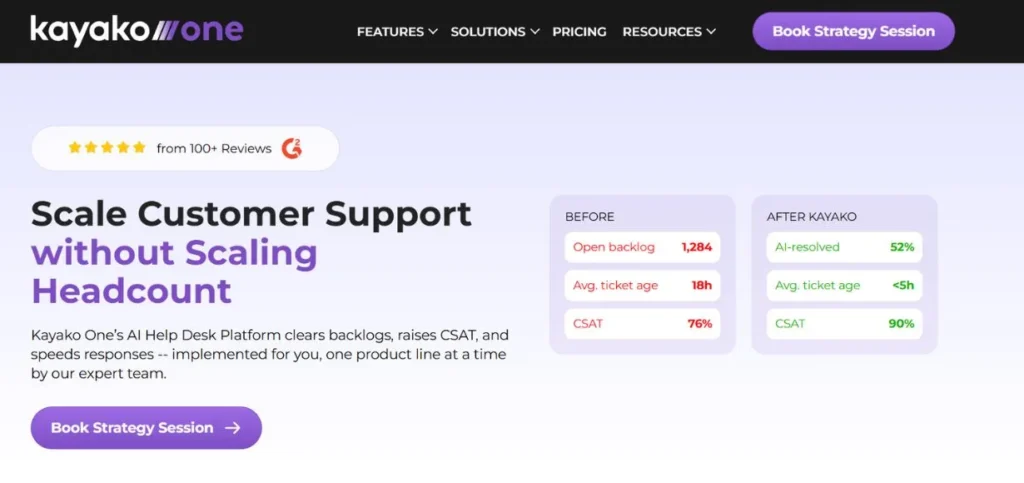
Kayako is a customer support software that is aimed at delivering integrated customer service across multiple channels. The platform combines email, live chatting, calling, and social media engagement in a single convenient platform. Kayako is intended to assist the teams in offering quality and consistent service to their customers, regardless of how they wish to reach out to them. The tool has good automation capabilities that will assist in directing customer queries to the appropriate agents and give prompt answers to frequent queries.
Key Features:
- Single customer conversations.
- Live team-working tools.
- Customer journey tracking
Pros:
- Good omnichannel support
- Clean, modern design
- Fair price format.
Cons:
- Actionable limitations in making customization choices.
- Fewer third-party integrations.
- Learning curve exists
Best For: Multi-channel support
Pricing: Starts at $15 per month per agent
Website: https://kayako.com
9. Zoho Desk
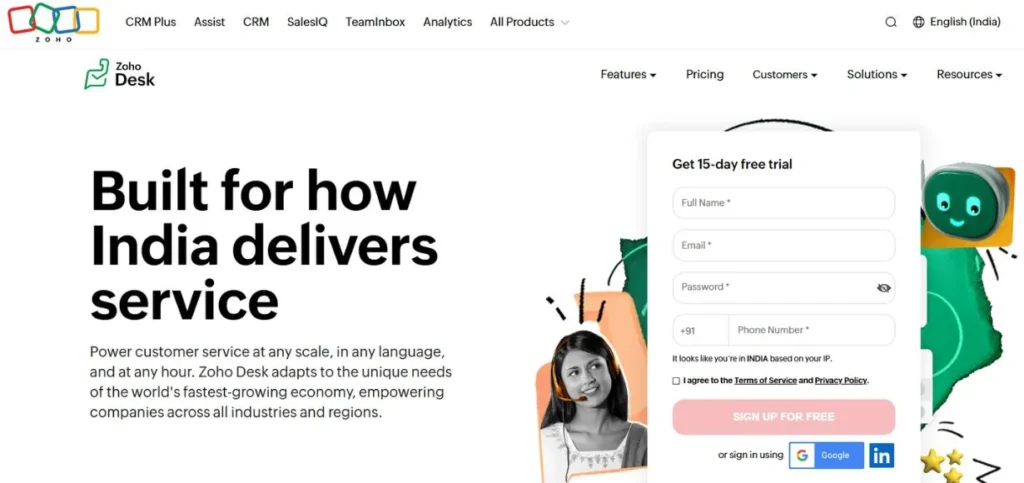
Zoho Desk is a subset of the Zoho family of business applications and, therefore, it is a good one to be used by businesses that have adopted other Zoho applications. The tool is a high-value and low-price customer support product, so popular with small to medium-scale businesses. Zoho Desk has all the prerequisites for successful customer service, such as ticket management, knowledge base, development, and rudimentary automation. The platform also has decent chatbot support software that can handle simple customer inquiries automatically.
Key Features:
- Ticket management, Multi-channel.
- Workflow automation
- Customer happiness rating
Pros:
- Integrates with Zoho
- Affordable pricing options
- Good feature set
Cons:
- Interface feels dated
- Limited advanced features
- Fewer integration options
Best For: Zoho users
Pricing: Free plan available, paid plans start at $14 per month per agent
Website: https://zoho.com/desk
10. Groove
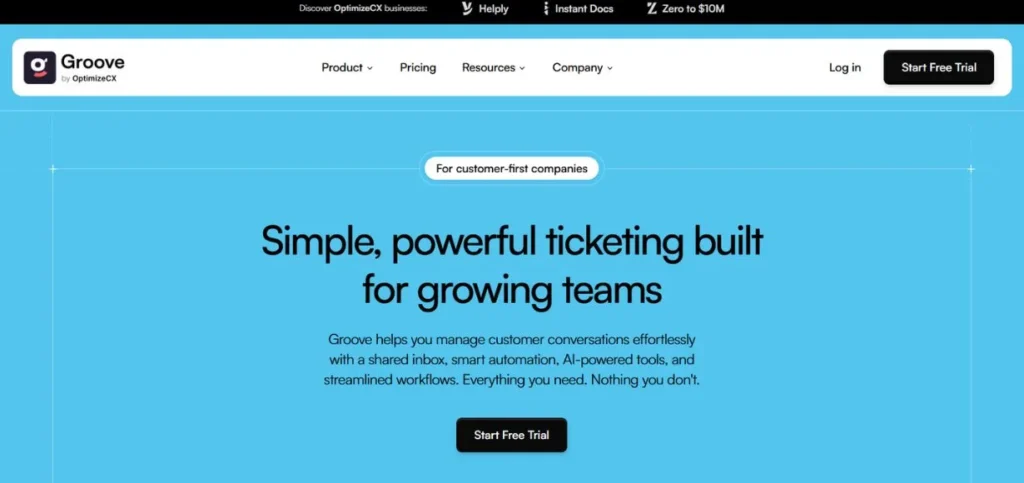
Groove is a software with a simple customer support tool intended to be used by small businesses and startups that do not need a complex customer service. The platform lays emphasis on easy and efficient customer support instead of flooding the users with excessive features. Groove transforms your normal email into a full-fledged customer support system and makes it user-friendly so that teams can get right down to using it. Such features as shared inboxes, collision detection (so that a ticket is not updated by two agents), and basic reporting are included in the tool.
Key Features:
- Shared email inbox
- Collision detection system
- Simple reporting tools
Pros:
- Very easy to use
- Affordable pricing model
- Quick setup process
Cons:
- Limited advanced features
- No phone support
- Basic automation only
Best For: Simplicity
Pricing: Starts at $16 per month per user
Website: https://groovehq.com
How to Choose the Right Customer Support Tools
- Consider Your Business Size: Small businesses require easy, cheap tools, and large firms require better, personalized customer support tools.
- Think About Your Channels: Select tools that support all the channels through which your customers are in touch with you, such as email, chat, phone, or social media.
- Plan for Growth: Choose customer tools that can expand with your business and support additional customers in the future.
- Check Integration Needs: Ensure that it is compatible with the other applications your company depends on, such as CRMs or e-commerce.
- Set a Realistic Budget: Look not only at the monthly price but also at installation charges, training hours, and the expenses of add-ons that you may require in the future.
Conclusion
One of the most significant decisions you can make in the business is not only to choose the appropriate customer support tools. Good tools will assist you in serving your customers quickly and with better results, resulting in happier customers and more business success. All of our 10 customer support tools have their own strengths. Others are ideal in small business ventures that are just beginning, and others are suited to huge organizations with complicated demands. Others are chat and messaging-centred, whereas others are email- and phone-support-centred.
It is essential to remember that the customer support tools best suited to your business are those that meet your needs, budget, and team size. Take time and experiment with various possibilities, and check what suits your business. Most of these tools have a free trial, and therefore, you can get to know them first before committing to them.
Frequently Asked Questions
1. What should be the top qualities that you seek in customer support tools?
The key ones are the multi-channel support (email, chat, phone), the possibility to manage tickets, automation possibilities, the reporting tools, and the ease of integration with the existing business systems.
2. How much is it going to cost me to purchase customer support tools?
Prices are different based on your requirements. Simple customer support services may begin at about 15-20 minutes per user/month, and complex enterprise systems may continue at 100 and above per user/month. Most of the tools provide free plans to small teams.
3. Will customer satisfaction actually be enhanced by customer support tools?
Yes, customer-support tools are generally associated with shorter response time, more effective customer-information organization, and more uniform service quality, all of which enhance customer satisfaction to a substantial degree.
4. Do I require other tools of chat, email, and phone support?
Not necessarily. Most of the customer support tools in the modern world deal with several channels under a single platform. Suchan’s integrated strategy tends to be superior to the handling of individual tools for each communication channel.
5. What is the time needed to introduce new customer support tools?
Simple tools only take several hours to implement, whereas the elaborate enterprise solutions take several weeks. New customer support tools can be installed in most small to medium businesses in a week or two.
 Get 50% off on Vault theme. Limited time offer!
Get 50% off on Vault theme. Limited time offer!